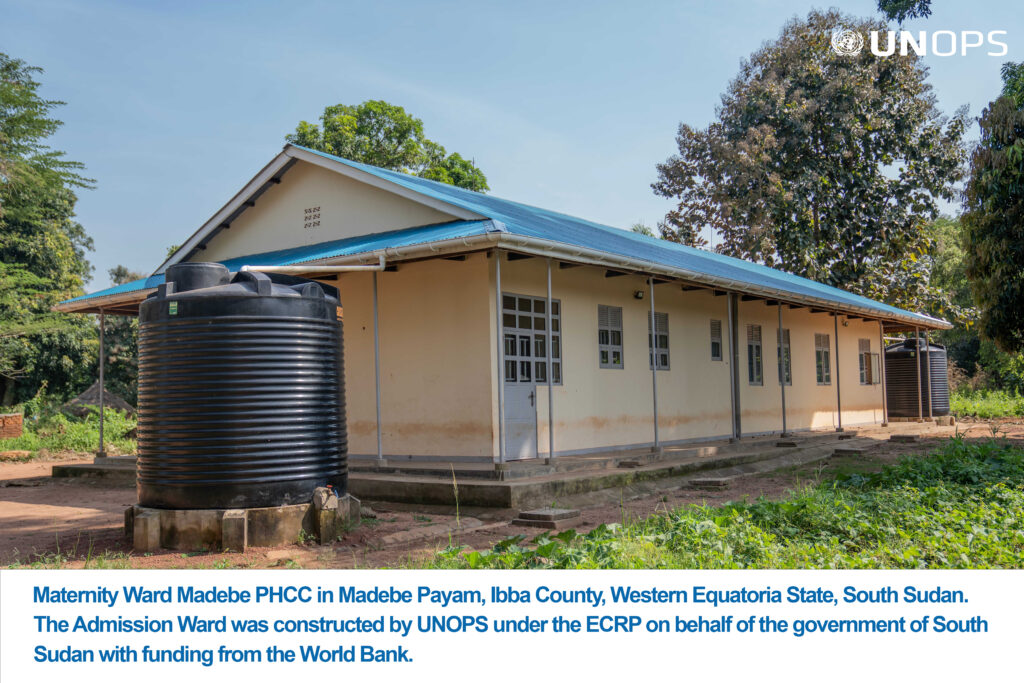The United Nations Office for Project Services (UNOPS) and the South Sudanese government concluded the first phase of a four-year community resilience project on Wednesday. The Enhancing Community Resilience and Local Governance Phase 1 Project (ECRP 1) is a $45 million project funded by the World Bank and implemented by UNOPS and the International Organization for Migration (IOM) on behalf of the government.
Launched in August 2020, ECRP 1 covers 20 selected counties across the country and is set to officially end in July 2024. The project will culminate with the handover of one of the 31 well-furnished health facilities to the government in Lokiliri Payam of Juba County, Central Equatoria State.
The project has brought significant positive changes, benefiting over 700,000 community members in all ten states of South Sudan. It has improved access to basic infrastructure, strengthened community institutions, and transformed livelihoods in the following counties: Pibor, Leer, Rubkona, Pariang, Wau, Raja, Jur River, Maban, Renk, Fashoda, Baliet, Kapoeta North, Rumbek Centre, Wulu, Aweil East, Aweil North, Tonj North, Ezo, Ibba, and Juba.
Speaking at an event marking the end of the project in Juba, Firas Raad, World Bank Country Manager for South Sudan, praised the cooperation between the government and implementing partners that led to the project’s success.
“This cooperation stretches back many years, starting with different projects and ultimately leading to the implementation of ECRP 1 and the launch of ECRP 2. I would like to thank our implementation partners, UNOPS and IOM, for supporting the government in this project designed to boost community resilience and support local government initiatives,” he said.
“We are very satisfied with the outcomes. You heard about all the facilities financed across different sectors, which have significantly impacted communities, households, and individuals. The challenge now is to sustain these achievements, making sustainability crucial,” Raad added.
Firas Raad, World Bank Country Manager for South Sudan, expressed delight over the government’s proactive approach and progress in various activities. He emphasized the importance of community resilience, especially given the economic, humanitarian, and climate-related shocks impacting South Sudan.
John Nyerenda Chidimula, Senior Project Manager for ECRP 1, highlighted the project’s achievements, including the construction of 31 health facilities, 68 classrooms, 258 water facilities, 11 market shelves, 11 kilometers of road, and four community and youth centers.
“This project has reached nearly 750,000 people in South Sudan across 20 counties. We’ve already seen improved access to services, education, and healthcare. Women report feeling safer delivering in these health facilities, and girls are more eager to attend school, thanks to the new classrooms and sanitary facilities,” Nyerenda said.
He further described the project as successful, noting that its positive impacts will become more apparent over time. “Before the project, many areas lacked functioning health facilities, and some primary schools didn’t even have classrooms. We established 258 water points in places where people previously used the same water sources as cattle and other animals. This project has significantly improved the situation,” he said.
Malony Anei, Chairperson of the Local Government Board, emphasized the project’s focus on infrastructure and institutional strengthening to empower local decision-making at the payam, boma, and county levels.
“People used to deliver babies under trees, but now maternity wards are built. Dykes protect communities from flooding. The project has taught people to be self-reliant, such as maintaining water points when pumps break. The World Bank, the Ministry of Finance, and the Local Government Board will not come back to fix them. The communities will sustain their facilities,” he said.
Following the conclusion of Phase One, UNOPS is now implementing Phase Two of the project, with a budget of $150 million. This phase aims to benefit approximately 950,000 people in 17 counties and two administrative areas in South Sudan. Phase Two will emphasize flood mitigation and climate resilience, ramping up activities in flood infrastructure and investments.




